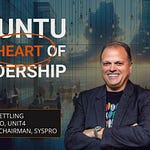In today's fast-paced business environment, fostering a strong company culture is essential for achieving smart growth. Join me, Bhavesh Naik, as I explore how aligning core values with effective communication can pave the way for success, as shared by my guest Ben Greiner, founder of Forget Computers.
Highlights
In this enlightening conversation, we explored the journey of Ben Greiner, the founder of Forget Computers, and how he carved a niche in the IT industry. Here are some key highlights:
The unique naming of his company, which speaks directly to the creative community.
How a targeted marketing strategy led to early success with local design firms.
The evolution of his business model from break-fix services to managed services.
The importance of focusing on a specific audience to drive business growth.
Insights on the human element in technology and the significance of maintaining a company culture that supports smart growth.
Introduction
Welcome to another insightful exploration of the intersection between technology and business strategy. Today, we're diving into the story of Ben Greiner, the visionary behind Forget Computers. His journey is a testament to the power of focusing on the needs of a specific audience while leveraging technology to solve real-world problems. Together, we'll uncover what it takes to build a business that not only thrives but also resonates deeply with its clients.
The Genesis of 'Forget Computers'
The story of Forget Computers began with an understanding of a unique market need. Ben recognized that creatives were often overwhelmed by technology and needed a reliable partner to handle their IT issues. This revelation led him to adopt a bold name that would resonate with his target audience. By choosing 'Forget Computers,' he communicated a clear message: let us manage the tech so you can focus on your creativity.
In the early days, the name served as both a marketing strategy and a filter for potential clients. Those who appreciated the name understood the ethos behind it, while those who didn't were probably not the right fit for the services offered. This clever branding strategy not only set the tone for the company but also helped establish a strong connection with the creative community.
Target Audience and Evolution of Marketing Strategy
Ben's initial target audience consisted of small ad agencies, photographers, and architects who lacked dedicated IT support. His marketing approach was refreshingly straightforward: a direct mail campaign to the top design firms in Chicago. This targeted strategy yielded impressive results, with a significant portion of those firms becoming clients within his first year.
What set Ben apart was his ability to speak the language of his audience. While many tech companies relied on jargon that often alienated creatives, Ben focused on clear communication that addressed their specific needs. This approach not only helped him build trust but also established Forget Computers as a go-to resource for technology solutions in the creative sector.
Managed Services and Business Growth
As the business evolved, so did its service offerings. Initially, Ben provided break-fix services, addressing immediate technical issues as they arose. However, he quickly recognized the need for a more proactive approach. This realization led him to explore the managed services model, allowing him to provide ongoing support and maintenance for his clients' technology.
The transition to managed services was a game changer. By charging a monthly retainer, Ben could offer consistent value while ensuring that clients received the support they needed before issues escalated. This model not only enhanced customer satisfaction but also provided a steady revenue stream, allowing for sustainable growth.
The Why and the Human Element in Technology
At the heart of Forget Computers is a commitment to the human element of technology. Ben believes that technology should serve to enhance human capabilities, not hinder them. This philosophy drives the company's mission to provide solutions that empower creatives, allowing them to focus on their passions without the burden of technical challenges.
This focus on the human side of technology is particularly relevant today, as many individuals and businesses grapple with the overwhelming influx of information and digital tools. By prioritizing the needs of its clients, Forget Computers positions itself not just as a service provider but as a partner in their creative endeavors.
Importance of Focus and Specialization in Business
One of the key lessons from Ben's journey is the importance of maintaining focus and specialization in business. While expanding service offerings may seem like a natural progression, it can dilute a company's message and brand identity. Ben experienced this firsthand as he began to attract non-creative clients, which ultimately led to a loss of clarity in his communications.
To counter this, he emphasizes the need for businesses to stay true to their core mission and target audience. Specialization allows for deeper expertise and a stronger connection with clients, ultimately leading to more effective service delivery. Ben's experience serves as a reminder that in a rapidly changing market, clarity of purpose and focus can be the keys to long-term success.
Vision and Core Values in Business
When we think about the foundation of a successful business, the vision and core values stand out as critical elements. Ben's journey with Forget Computers illustrates that a clear vision is not just an abstract concept; it's a guiding light that shapes every decision and interaction within the company.
Initially, Ben's vision was intuitive, focusing on building a reliable company that clients could trust. However, it wasn't until he participated in the Goldman Sachs 10,000 Small Business program that he began to articulate this vision. This program pushed him to define what his company stood for, which in turn allowed him to align his team's efforts with a shared purpose.
Effective communication of core values can transform a workplace. When Ben outlined the values that resonated with his team, it created a sense of ownership and accountability. Employees began to reflect these values in their interactions, fostering a culture where everyone felt empowered to contribute meaningfully.
Redefining Business Growth
In our conversation, Ben shared a refreshing perspective on the concept of growth. Too often, businesses equate growth solely with revenue increase. However, Ben argues that growth can manifest in various forms—personal development, team cohesion, and even emotional intelligence.
This multifaceted view of growth encourages entrepreneurs to look beyond the numbers. For instance, Ben noted that many small businesses struggle to break the million-dollar revenue mark, and that’s okay. The focus should be on building a sustainable business that nurtures its team and clients rather than chasing arbitrary financial milestones.
By redefining growth, entrepreneurs can create environments that prioritize well-being and satisfaction over relentless expansion. This approach allows for a more balanced perspective on what success truly means.
Culture and Communication Challenges
Culture is the backbone of any organization, yet it can be challenging to cultivate. Ben emphasized that the culture within Forget Computers was not something he imposed but rather something that evolved organically. However, once he recognized its importance, he became intentional about shaping it.
One of the biggest challenges he faced was communication. In the tech industry, it’s easy to get caught up in jargon that alienates clients. Ben stressed the need for clear communication, both internally and externally. By fostering an environment where team members could openly discuss frustrations and challenges, he not only improved morale but also enhanced client relationships.
When team members are encouraged to communicate effectively, it leads to better problem-solving and a more cohesive team dynamic. This emphasis on communication also serves as a reminder that technology is a tool meant to serve humanity, not the other way around.
The Exit Strategy and Lessons Learned
As Ben shared his story about the exit from Forget Computers, it became clear that preparing for this moment is essential for any business owner. He learned that having an exit strategy is not just for those who plan to sell; it’s about positioning the business for sustainable growth and resilience.
Ben's experience taught him to think about his business's long-term future, even when he was not actively seeking an exit. By focusing on building a strong foundation and a trustworthy team, he ensured that when the opportunity arose, he was ready to make a strategic move.
Moreover, the lessons he learned from his time in the Goldman Sachs program played a pivotal role in his preparation. Understanding the importance of culture and values helped him navigate the complexities of a potential sale. This foresight ultimately contributed to a successful transition, allowing him to explore new opportunities with confidence.
Advice for Aspiring Entrepreneurs
For those considering starting their own business, Ben's advice is simple yet profound: take the leap but be prepared. Entrepreneurship is not just about having a great idea; it requires careful planning, resilience, and a willingness to adapt.
He encourages aspiring entrepreneurs to do their research, understand their market, and be clear about their vision. It's essential to articulate your core values and ensure they resonate with your team. This clarity will guide your decisions and help you navigate challenges along the way.
Most importantly, Ben emphasizes the importance of action. Many people talk about their dreams but hesitate to take the first step. Overcoming perfectionism and embracing the learning process can lead to significant growth and success.
Pseudo vs Real Productivity in the Age of Technology
In today's digital age, distinguishing between pseudo productivity and real productivity has never been more crucial. Ben highlights that many individuals and businesses fall into the trap of feeling busy without achieving meaningful results.
This phenomenon often stems from the overwhelming influx of information and communication tools at our disposal. To combat this, Ben advocates for a more intentional approach to productivity—prioritizing tasks that align with your core values and long-term goals.
By focusing on what truly matters and eliminating distractions, businesses can enhance their productivity and ultimately achieve smarter growth. It’s about working smarter, not harder, and ensuring that technology serves as an ally rather than a hindrance.
FAQ
What is the most important aspect of company culture?
The most important aspect of company culture is clear communication. When team members feel comfortable expressing their thoughts and ideas, it fosters a collaborative environment that drives success.
How can small businesses redefine growth?
Small businesses can redefine growth by focusing on various dimensions, such as team development, client satisfaction, and personal fulfillment, rather than solely on revenue increases.
What should entrepreneurs consider when planning an exit strategy?
Entrepreneurs should consider the long-term vision of their business, the culture they’ve built, and the potential impact on their team and clients when planning an exit strategy.
How can technology enhance productivity?
Technology can enhance productivity by streamlining processes, improving communication, and providing tools that help teams focus on their core objectives without distractions.
Getting In Touch with Ben Greiner
If you’re interested in exploring these ideas further or have questions, connecting with Ben is a great first step. You can find him online on LinkedIn.
Get the Unfair Advantage I Have
A rewarding perk of hosting this podcast is that I go through the conversations multiple times.
As I watch the video, listen to the audio, review the transcript and write about it, I can’t help but have new insights about the content we covered. By the time I publish an episode, I have a much deeper understanding of the subject we discussed than we first had the conversation. I have the benefit of coming to this material from different modalities of learning.
I want to level the playing field for you. I also want you to have the benefit of engaging with this material from different angles without getting bored or jaded. For this reason, I have created yet another experience for you to work with.
Click the button below to engage with this episode in yet another way.
This article was created with the help of AI from a recorded conversation between Ben Greiner and Bhavesh Naik on The Business Philosopher Within You podcast. Click below to view the YouTube version of this conversation.












Share this post